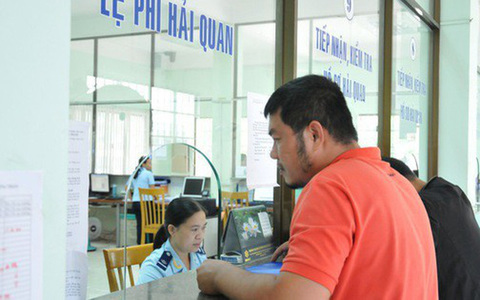
Prime Minister Nguyen Xuan Phuc stressed the need to shift from pre-inspection to post-inspection, issue regulations and standards on evaluation of transparency, and reduce unnecessary conditions for enhancing production. — Photo nld.com.vn
Prime Minister Nguyen Xuan Phuc stressed the need to shift from pre-inspection to post-inspection, issue regulations and standards on evaluation of transparency, and reduce unnecessary conditions for enhancing production.
The PM made the statement during a teleconference on promoting the National Single Window (NSW) and ASEAN Single Window (ASW) and trade facilitation in Ha Noi on July 24.
He has asked the Ministry of Finance to urgently submit a draft action plan on the promotion of ASW, NSW and trade facilitation by the end of August, and a draft decree on the work by the end of September this year.
“The action plan and decree should include breakthrough proposals, more effective and practical solutions, especially in management of import-export goods, thus dealing with problems and strengthening both import-export activities as well as regional and international trade,” Phuc said.
Phuc stressed the need to continue building a better business environment for all economic sectors with the aim of becoming a leader in ASEAN and meet the Organisation for Economic Co-operation and Development’s (OECD) standards.
Underscoring the need to control and combat trade fraud and smuggling, the PM believes that it is necessary to design strict measures to deter organisations and individuals from violating regulations on food safety or committing trade fraud.
He hailed the efforts of the National Steering Committee for ASW, NSW and Trade Facilitation (Steering Committee 1899), as well as relevant ministries and sectors, especially the business community, in implementing tasks assigned by the PM and Government in the field.
He asked all ministries and sectors to work more closely to improve the business environment, which would in turn enhance national competitiveness and support sustainable growth. The PM requested a reduction in shipments subject to specialised inspections to below 15 per cent, but still meeting demands of the State management agencies and ensuring people’s health.
He demanded that 50 per cent of goods, products and procedures subject to specialised inspection be simplified and eliminated. At the same time, examination methods and criteria should be made more transparent by issuing evaluation standards, he stated.
The PM also asked provinces and cities to cooperate closely with Steering Committee 1899 and the Ministry of Finance as well as other relevant agencies to supervise the implementation of NSW and ASW mechanisms and trade facilitation in each locality.
According to Deputy PM Vuong Dinh Hue, who is head of Steering Committee 1899, the NSW customs mechanism has made significant contributions to administrative reform in Viet Nam since it was officially launched in November 2014, creating more favourable conditions for enterprises.
The Customs Department under the Ministry of Finance said on July 23 that a total of 53 administrative procedures in 11 ministries and sectors have connected to the NSW mechanism so far.
All customs procedures are now processed through the NSW and up to 99.65 per cent of businesses have used e-procedures at all customs offices across the country.
By the end of this year, an additional 143 administrative procedures will be carried out through the mechanism, raising the total to 196, equivalent to 78 per cent of the 251 procedures expected to be implemented by 2020.
As of July 15, 1.34 million dossiers from 22,800 businesses were handled through this mechanism.
Besides benefiting enterprises, the implementation of the NSW mechanism has also brought a lot of benefits to State management agencies as they become familiar with conducting administrative procedures without paperwork, and have more experience in simplifying and modernising administrative procedures, Hue said.
It has prepared Viet Nam well for negotiations towards bilateral and multilateral agreements on the mutual recognition of technical standards, and e-licenses and e-certificates in order to simplify administrative procedures in importing countries, thus shortening customs clearance time and facilitating the export of Vietnamese products, he said.
According to a World Bank report, in 2017, Viet Nam was able to slash three hours off customs procedures for exported goods, from 58 to 55 hours, and 6 hours for imported goods, from 62 to 56 hours.
Meanwhile, the cost of direct customs clearance at the border gate for a consignment dropped by US$19. It is estimated that with more than 11 million customs declarations in 2017, the enterprises were able to save over $200 million, while saving more than 16 million hours from storing the exported items in warehouses and more than 34 million hours from storing imported goods in warehouses.
However, Nguyen Cong Binh, deputy head of Viet Nam Customs, said that the number of procedures connected to the NSW – 53 out of 251 – is still modest compared to the target set.
Meanwhile, many businesses still complained about some of the shortcomings in the implementation of NSW mechanisms. They said that many procedures are still complicated and the sharing of information among management agencies remains ineffective.
Binh emphasised the importance of implementing an information technology system to serve the implementation of the NSW mechanism as well as building a supervision and assessment mechanism within the business community on the implementation of tasks by ministries and sectors.
Regarding the ASEAN one-stop shop mechanism, Minister of Finance Dinh Tien Dung said as of January 1, 2018, Viet Nam officially exchanged form D certificates of origin (C/O) with Singapore, Malaysia, Indonesia, and Thailand.
As of July 15, Viet Nam received 32,949 certificates from the above countries while sending 14,214 ones to them. Viet Nam is working with Brunei, Cambodia and the Philippines to establish a system to pilot the exchange of form D C/O, and is partnering with Thailand, Indonesia and Malaysia to launch a pilot system to exchange ASEAN customs declarations.
Apart from ASEAN, Viet Nam is also negotiating to complete protocols and build a system to share information with the Eurasian Economic Union about customs declarations and C/O. — VNS